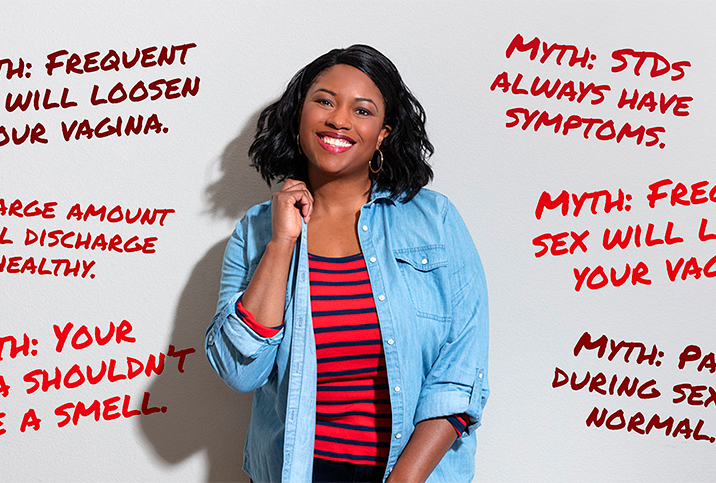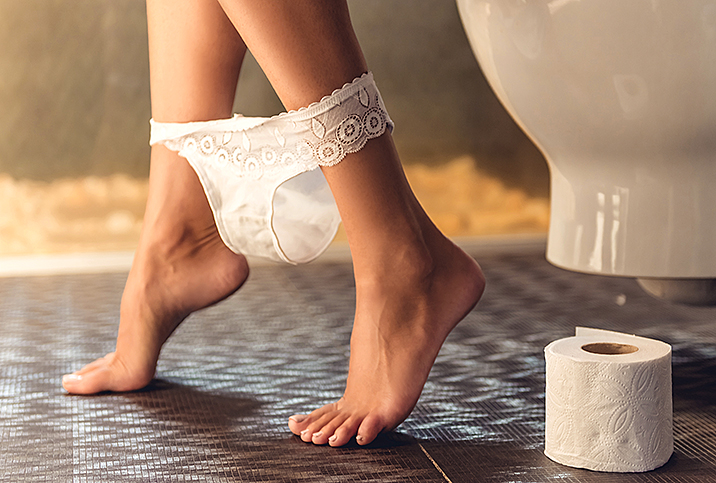Vaginal Health: Myths & Misconceptions

The vagina is one of the most complex and misunderstood body parts, and that's true even for people who have one. This is in part because many of us are taught so little about our bodies as we're growing up and, sadly, there has been little research focused on the daily functions of the vagina.
This leaves many people in the dark about exactly how the vagina operates and what to expect from it on a day-to-day basis. But to help clear some of this fog, we've sifted through the top vaginal health myths and misconceptions to find some truth.
Myth: Frequent sex will loosen your vagina.
Reality: This common misconception—that the vagina could be stretched out from too much use—was dreamed up to discourage women from having sex with multiple partners. It is, of course, completely untrue.
The vaginal wall is part of a collection of muscles called the pelvic floor, and these muscles can and should be exercised. Muscle atrophy in the vagina is caused by having a weak pelvic floor. If muscles in the vagina are allowed to atrophy, or weaken, over time, that can lead to health issues such as bladder continence, intestinal health and a loosening of the vaginal wall.
To combat this, perform pelvic floor exercises to tighten your vaginal wall. Frequent Kegel exercises strengthen the pelvic floor muscles. Just like any muscle, the more they are used, the stronger they become, and your strengthened muscles will enhance the pleasure for you and your partner during sex.
Myth: A large amount of vaginal discharge is unhealthy.
Reality: This myth often leads to a misdiagnosis of yeast infections.
It's important you know that your monthly discharge is healthy. Many people believe large quantities of discharge are a sign their vagina is trying to flush out bacteria, but the quantity is not as important as the consistency, and this varies from woman to woman.
We always want to know what's "normal," but what we should really be focused on is what's healthy for each of us.
Vaginal discharge can increase at different times during your monthly cycle, and when it comes to what's healthy, any quantity of discharge certainly is as long as you aren't experiencing itching, redness or pain. Vaginal discharge color can also change throughout the month. It can go from opaque, thick and sticky to clear and stringy like egg whites.
Myth: STDs always have symptoms.
Reality: Many sexually transmitted diseases (STDs) go undiagnosed for years.
This myth is dangerous and one that might prevent anyone from being diagnosed with a sexually transmitted infection (STI) or STD, and that could result in major long-term consequences for your body as well as be a source of infection for your sexual partners.
Some of the most dangerous STDs such as pelvic inflammatory disease and cervical dysplasia, which could lead to cervical cancer, can go undiagnosed until abnormal cells are found during a Pap smear. Other STDs, including trichomoniasis, can be brushed off as a chronic yeast infection until a secondary issue occurs.
Myth: Pain during sex is normal.
Reality: Pain is always a warning. If you have pain during sex, there's a good chance something is wrong.
The simplest short-term solution might be to adjust your position to make sex more comfortable. But if that doesn't work, don't ignore the pain.
Pain during sex is your body's way of telling you something is awry. There are conditions, such as sexual dysfunction, STDs or yeast infections that can cause pain during sex. It's important to listen to your body.
If sex becomes painful, contact your doctor because sexual dysfunction that causes pain is an easily treated condition many women experience.
Myth: Your vagina shouldn't have a smell.
Reality: While it's true that a strong odor can signal a health condition, a general smell is a sign of a healthy vagina.
If you experience a strong odor and have other symptoms, you could have an infection that requires the attention of your doctor. Frequent washing and douching are not the answer though. The truth is, the more you wash, the unhealthier your vagina will become. Your vagina is its own cleaning machine, and the best thing you could do is stop washing your vagina.
Please don't waste hundreds of dollars on fragrances, douches and vaginal washes to keep your vagina from smelling like a healthy vagina.
If you feel the need to wash your vagina for whatever reason, use warm water and a pH-balanced soap.
Listen to your body
Don't let the myths and misconceptions about vaginal health trick you into ignoring what's good for your body. The best advice to maintain vaginal health is to take notice of what your body is telling so you know when something is wrong and can immediately contact your gynecologist.

















